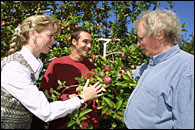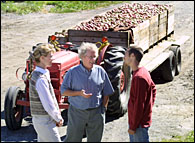An apple a day keeps the developers away
An apple a day keeps the developers away McGill University
User Tools (skip):
An apple a day keeps the developer away
 Susan Campbell, residences food services manager; apple grower Alain Boucher; and Kees Vanderheyden, director of the Gault Nature Centre.
Susan Campbell, residences food services manager; apple grower Alain Boucher; and Kees Vanderheyden, director of the Gault Nature Centre.PHOTO: Owen Egan |
|
It's quite possible that not since the fall of the apartheid regime in South Africa has eating -- or not eating -- a particular variety of apple been a political act for McGill students. Truth be told, those students choosing Mont St. Hilaire apples at any of the downtown residence cafeterias, or at the Burnside Hall and McIntyre snack bars, are likely not aware of the impact of their choice. On the shelf, all that sets Lobos apart from the out-of-province apples, Golden Delicious, Red Delicious and Granny Smiths, is a sign reading "Today's variety: Lobo. Fresh Quebec harvest apples from Mont St. Hilaire. Support your local growers and choose Quebec apples."
What the students don't know -- and what they will know once the full campaign is up and running -- is that by buying apples from the big Monteregian mountain just 40 minutes to the southeast of Montreal they are helping preserve the ecology of the last remnant of the primeval forest in the St. Lawrence Valley.
You see, Mont St. Hilaire is a UNESCO Biosphere Reserve and most of the wild part of the mountain is owned by McGill under the name of the Gault Nature Reserve, named after Brigadier Hamilton Gault, who bequeathed the land to McGill 45 years ago. Half of the 12 square miles is open to the public and is known as the "Centre de la nature." The other half, the preservation area, is closed to the public and used for research.
The designation biosphere reserve, which covers the entire mountain and the town on its flanks, while prestigious has no legal status. All that prevents luxury housing from creeping further onto the doorstep of the nature reserve is a provincial moratorium on the conversion of agricultural lands.
While Kees Vanderheyden, director of the Nature Centre, and Martin Lechowicz, director of the Gault Nature Reserve and McGill professor of biology, appreciate the government's support, they don't want those orchardists who might profit from selling to a developer to feel that they are paying the price for preserving a green buffer zone around the mountain. For the past three years, for instance, Vanderheyden has been working to support the "green economy" by selling at the centre's boutique any non-perishable foods produced locally, such as maple products, apples, jellies and ciders, etc. "All the profits go to the growers, all of whom must be local," he says.
 Owen Egan
Owen Egan |
|
He also had a new maquette of the mountain made that includes the orchards and the town in recognition of the fact that the biosphere reserve doesn't comprise only the wild areas, and that all three sectors of the mountain ought to benefit from one another.
McGill downtown is a fourth player and Lechowicz felt the University could be more active in being a partner in Mont St. Hilaire's green economy. Speaking to The Reporter two years ago, he lamented the fact that it was largely only people from biology, geology and geography who were active on the mountain.
And this is where McGill and the apples come in: residences.
Lechowicz, who is also a member of the Senate Sub-Committee on the Environment, brought up the idea of McGill buying and selling apples from the orchards, both as a means of further supporting the orchardists and to remind members of McGill of their connection to that other mountain, an extraordinary place for study and leisure. The sub-committee supported the idea, as did Susan Campbell, residences food services manager.
Campbell already had the autumnal habit of buying and displaying locally grown apples in baskets in the cafeterias, and she's pleased to take that support one step further this year. Every Monday, Alain Boucher, of the fourth generation of apple growers at Les Vergers Boucher et frères, brings in 15 crates of apples (roughly 1,500 apples) and by Friday they're gone. And this is an arrangement that could last year-round.
The students who were interviewed for this article said they appreciated being able to buy local apples but were unaware of the link between Mont St. Hilaire and McGill. That will change both with more publicity about the mountain and with increased activity for students at the nature reserve. Saeed Mirza, professor of civil engineering and head of the Senate Sub-Committee on the Environment, could see, for instance, student excursions to the mountain during future orientation weeks.
On the academic front, interest in the mountain has widened. Last spring, for instance, Angelina Mehta and Dawn Foster, two students in the Master's of Business Administration program, completed a preliminary business study of the orchards. The students, guided by Vanderheyden and Lechowicz and supervised by management professor Steve Maguire, conducted an assessment of the orchards' vulnerability and made recommendations for future projects. Maguire hopes to interest other graduate and undergraduate students from his faculty to continue working with the apple growers, the nature centre and the local chamber of commerce.
Vanderheyden is keen to have extra help on the marketing and business management side of the green economy and he is inspired by a similar biosphere reserve in Rohn, Germany. There, the surrounding municipalities developed a whole apple culture -- apple vermouth, apple beer, partnerships between restaurants and the apple growers, etc. -- in order to have a strong green economy protecting its mountain. What McGill does is an important brick in building that economy around Mont St. Hilaire.

